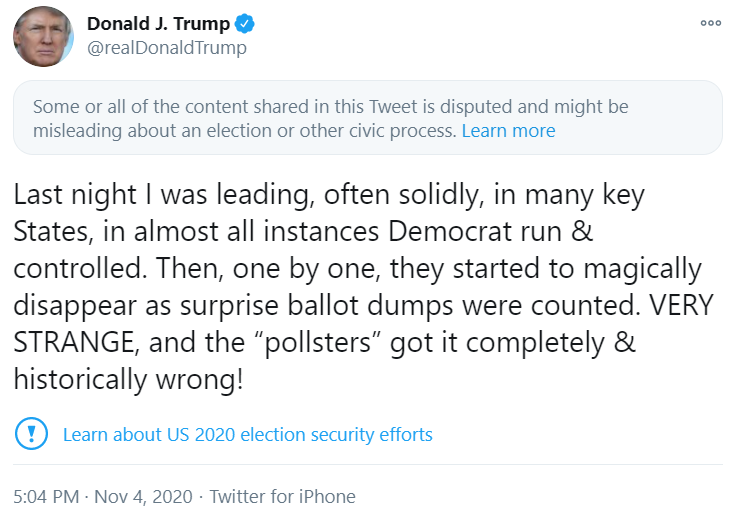Online platforms limit reach of president’s ‘misleading’ claim of ballot irregularities during vote-counting process

WASHINGTON (AFP) — Twitter labeled three of US President Donald Trump’s tweets as misleading Wednesday as a battle over the knife-edge national election spilled into social media.
The latest action came when a tweet from the president claimed ballot irregularities during the vote-counting process.
Trump alleged that there had been “surprise ballot dumps” in states where he had been leading Democrat Joe Biden in the race for the White House.
Twitter’s action made the comments less visible and unsharable, and users seeking to read the post were required to click through a warning that “some or all of the content shared in this Tweet is disputed and might be misleading.”
A Twitter spokesperson said the action was taken “in line with our Civic Integrity Policy,” and would “significantly restrict engagements” with the tweet.
A similar action was taken against two earlier tweets by the president suggesting the Democratic nominee was seeking to “steal” the election.

The Twitter spokesperson said it took action on a number of other comments including premature victory claims by a North Carolina Republican Senate candidate and one comment contending prematurely that Biden had won Wisconsin.
“As votes are still being counted across the country, our teams continue to take enforcement action on Tweets that prematurely declare victory or contain misleading information about the election broadly,” Twitter said.
Facebook also added disclaimers to messages by Trump as social platforms scrambled to live up to a pledge to root out misinformation about the election.
Fighting misinformation
Facebook has activated a command center watching the platform and ready to react to misinformation during the vote.
“Our Election Operations Center will continue monitoring a range of issues in real time,” said a Facebook statement.
Nonprofit activism group Avaaz said its “war room” was also keeping tabs on Facebook and reported “last-ditch” Spanish-language misinformation, including posts about the prospects of a post-election coup or civil war.
The Election Integrity Partnership research coalition said a Google search for swing states turned up a YouTube video channel that was displaying a fake live feed of election results.
“Thousands of people may have been duped into streaming a fake YouTube video purporting to show election night results,” the researchers said in a post.
YouTube removed the video.
Some groups at Facebook were being used to share stories of going to polling places without face masks to “scare liberals away,” according to a post by Kayla Gogarty of nonprofit watchdog group Media Matters.
And a #stopthesteal hashtag was being used on social media posts tailored to cast doubt on the voting process.

Facebook stressed that it would place warning labels on any posts which sought to claim victory prematurely.
The platforms have pledged to step up scrutiny of false election information, including premature claims of victory, seeking to avoid a repeat of 2016 manipulation efforts.
Over past days, Facebook and Twitter added disclaimers to Trump posts calling into question the integrity of mail-in ballots.
Twitter last month updated its policy aiming to prevent efforts to manipulate or interfere in elections. That calls for actions against false claims for victory or any incitement to violence.
YouTube has also sought to limit the sharing of videos with election misinformation. Last month it began adding information panels to videos about voting by mail.
As reported by The Times of Israel
